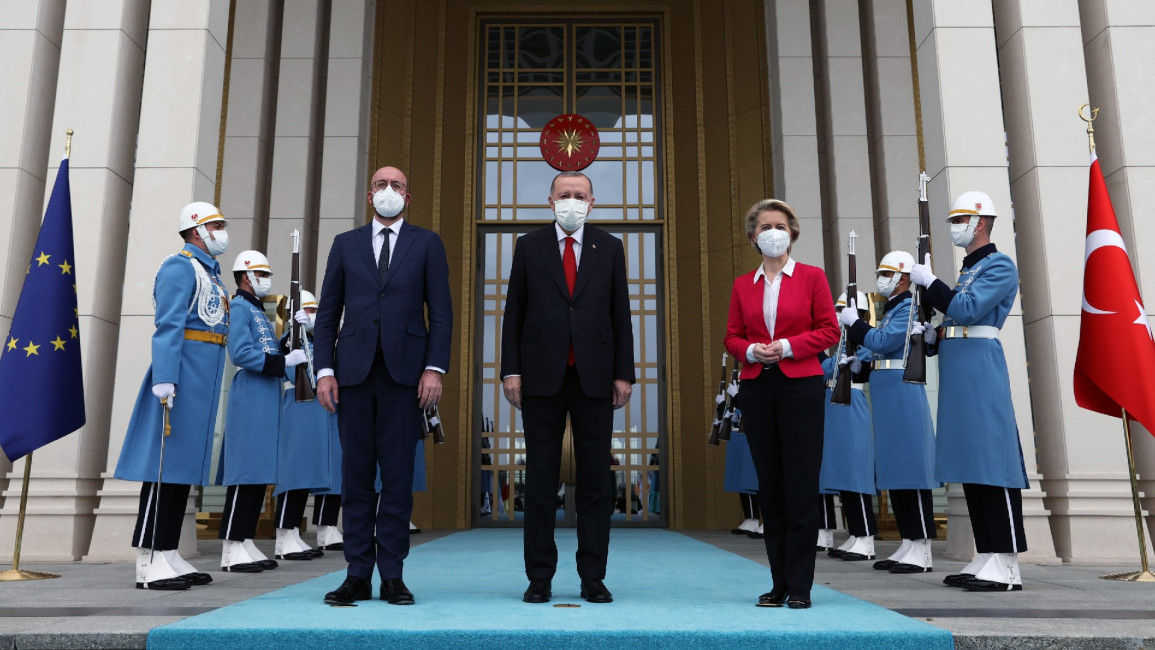EU chiefs press Erdogan on rights while stressing better ties
The European Union's top two officials on Tuesday expressed deep worries about human rights in Turkey while voicing hope for stronger ties in their first meeting in a year with President Recep Tayyip Erdogan.
European Commission chief Ursula von der Leyen and European Council president Charles Michel travelled to Ankara to test Erdogan's avowed commitment to improve relations after months of disputes.
Tensions have spiked over Turkey's hunt for gas in disputed eastern Mediterranean waters and an aggressive foreign policy push across North Africa and the Middle East.
But the Turkish leader softened his rhetoric as the threat of EU sanctions escalated and US President Joe Biden replaced Erdogan's friend Donald Trump in the White House.
EU officials said von der Leyen and Michel wanted to lay out the terms for Erdogan on which they expected to build better relations with the bloc's strategic partner on its southeastern flank.
The two emerged after nearly three hours of talks to stress they had pressed Erdogan hard on Turkey's deteriorating rule of law and crackdown on civil and political rights.
"Human rights issues are non-negotiable," said von der Leyen. "They have absolute priority without any question."
Michel said the two had "shared with President Erdogan our deep worries on the latest developments with Turkey in this respect, in particular on the freedom of speech and the targeting of political parties and media."
Focus on migrants
Erdogan did not address reporters but his office issued a statement reaffirming Turkey's position that it wanted the EU "to take concrete steps to support a positive agenda".
"The final objective of Turkey's EU process is full membership," Erdogan's office said in reference to accession talks that have been frozen over the past decade.
|
EU officials countered that any improvement depended on how Erdogan - who was leader when Turkey formally opened talks to join the bloc in 2005 - acts and whether he remains a constructive partner.
Von der Leyen and Michel took pains to underline the crucial role Turkey has played in stemming Europe's refugee crisis by setting up shelter for roughly four million of people from Syria and other conflict zones.
Turkey has received billions of euros in aid under the 2016 agreement and von der Leyen said she was prepared to update the deal's terms.
"A revised Turkey-EU migration deal together with the main provisions contained therein would go a long way towards addressing the refugee problem and revitalising Turkey-EU relations with a positive agenda," she said.
'New momentum'
The EU has also dangled the possibility of visa liberalisation and upgrading the sides' 25-year-old customs union.
But Tuesday's talks came on the heels of Turkey's withdrawal from a treaty combating violence against women and the launch of a formal bid to shut down the country's main pro-Kurdish party.
The mixed messages from Erdogan - softening his foreign policy while hardening his stance at home - have forced the bloc to calibrate its tone with extra care.
A European official briefed on the meeting by von der Leyen said it was "too early to say at this stage whether human rights and the rule of law will be a sticking point" down the line.
Von der Leyen herself pointed out that Turkey has shown an interest in "re-engaging with Europe" and that she was ready "to give the relationship a new momentum."
The bloc will now reassess its position before a European Council leaders' meeting on June 24-25.
The Turkish presidency said Erdogan urged Brussels to "not allow some member states hijack Turkey-EU ties".
His comment appeared to refer to pressure by Greece and France for the bloc to impose sanctions on Turkey for its drilling activities near the divided island of Cyprus.
Germany has spearheaded efforts to de-escalate tension and avoid any repercussions that could force Erdogan to follow through on threats to open Turkey borders so that migrants can pass unhindered to Europe.



